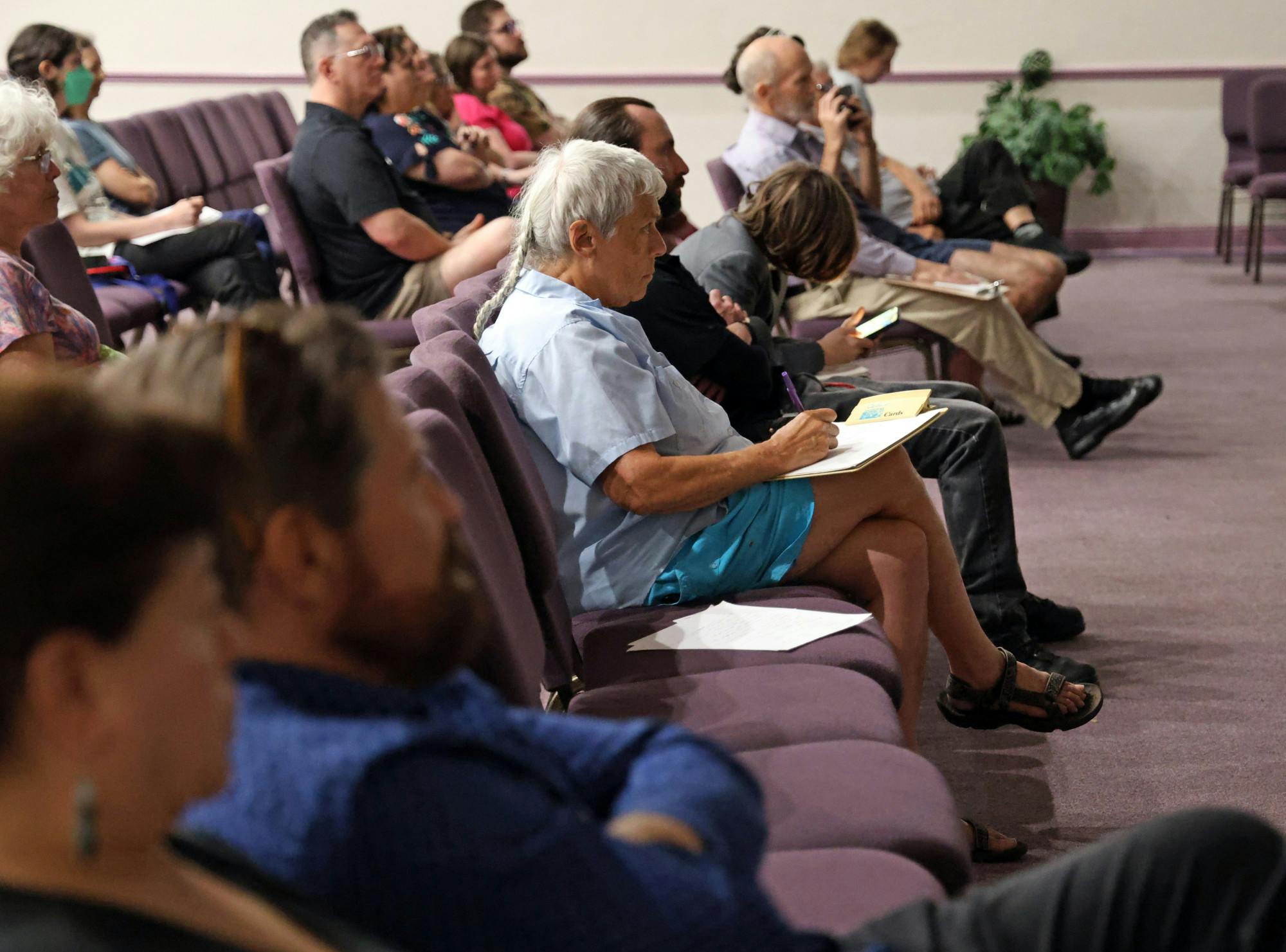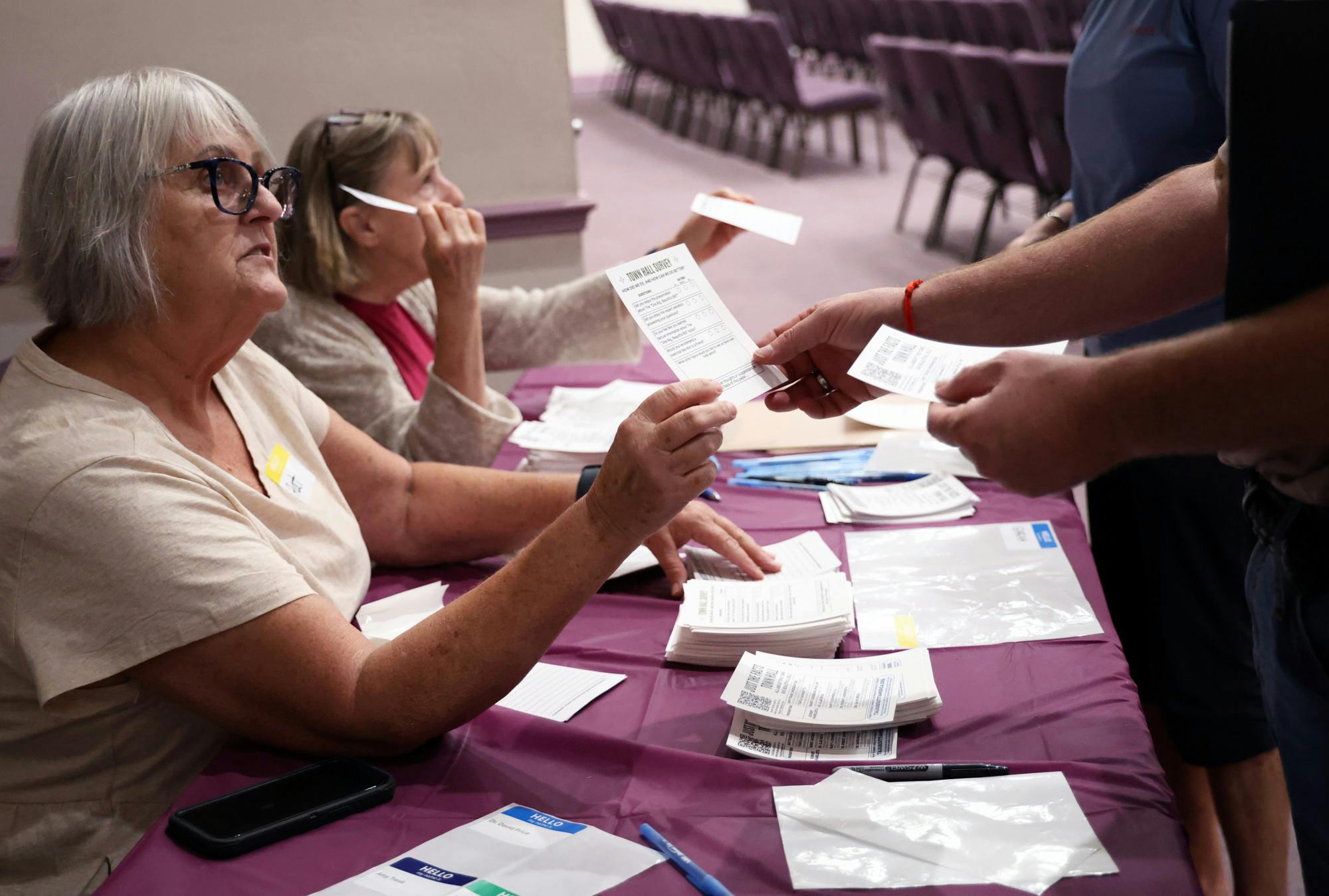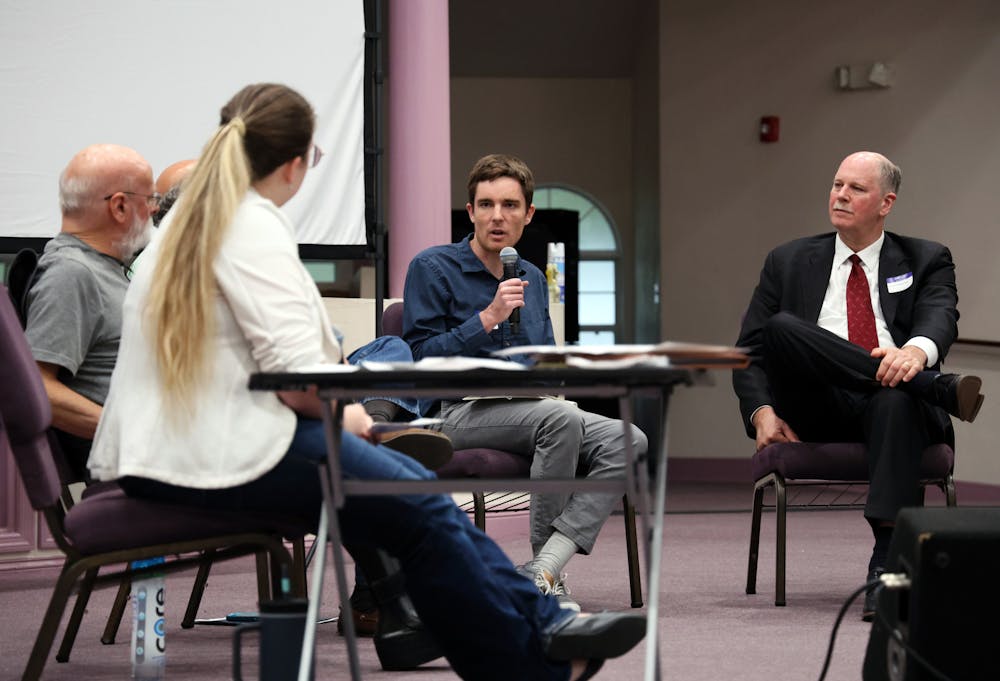Over 75 people gathered Thursday night in a church-turned-town hall to discuss the One Big Beautiful Bill Act, a budget bill passed by the U.S. House May 22. Endorsed by President Donald Trump, the bill faces a Senate deadline of July 4.
The event, held in the Upper Room Ministries of Greater Gainesville, was hosted by grassroots nonpartisan group Talk About It America. It aimed to help residents understand how the legislation may impact their day-to-day lives.
The over 1,000-page bill bundles 32 measures and proposes major cuts to programs like SNAP, Medicaid and Planned Parenthood.
The Supplemental Nutrition Assistance Program provides food assistance to low-income families by supplementing their grocery budgets. Medicaid covers medical services for low-income adults and people over the age of 60. Planned Parenthood is a nonprofit that provides reproductive and sexual healthcare services to the public and leads sexual education programs.
Thursday’s program discussed the budget plan and was followed by a Q&A session.
Panelists included Santa Fe College political science professors David Prince and Alan Beck, UF economics associate professor Robert Ainsworth and First Amendment Attorney Gary Edinger.
Amy Trask, a community organizer and former U.S. House candidate, moderated the forum and discussion. Everyone should come together to talk about the budget bill, she said.
“The One Big Beautiful Bill is a really big and critical piece of legislation that impacts our everyday [lives],” Trask said. “It’s not an abstract policy change. It’s tangible differences that will affect millions of people’s ability to put food on the table, to be able to go to the doctor.”
As some participants took notes, others watched and nodded along. The presentation lasted over an hour.

The Byrd Rule, included in Congress for budget bills, tries to limit the bill by removing parts unrelated to spending, including non-budget items.
Multiple sections of the bill were rejected due to Byrd Rule guidelines.
If passed, the budget bill would have major impacts on government-offered social services, student loans, energy policies and judicial enforcement. SNAP and Medicaid could also see transformative cuts.
Because of the multiplier effect, which explains how a small amount of spending can lead to bigger changes in the economy, funding cuts to social programs could be harmful for the local economy. For every federal dollar invested into SNAP, another $1.50 to $1.80 goes back into the economy.
To make the forum less intimidating, participants had two options to contribute their questions: They could speak into a microphone, or they could write an anonymous question on a piece of paper handed to them at the door.

One audience member wrote a question asking if Planned Parenthood would offer fewer services due to decreased funding and how lower-income families would be affected by SNAP cuts.
The bill proposes that states pay the majority of SNAP costs, even though the obligation would be in violation of the Byrn Rule. It would also require those between the ages of 18 and 64 to work 80 hours per month and reduce the value of food stamps.
Robert Ainsworth, a UF economics associate professor, said the U.S. ranks high for GDP per capita but low for social safety net factors like life expectancy and infant mortality.
Social programs directly impact the outcomes of children from low-incomes families, he said.
“Early childhood is a development period, ” Ainsworth said. “Whether you live in a good environment or a bad environment, early childhood has effects on just how well you would develop.”
It goes on to impact the children for the rest of their lives, like their “ability to work to avoid being homeless,” he said.
Gene Tysowsky, a 72-year-old Gainesville resident, said he attended the event because he knew the extent of the bill’s impact. The forum taught him new things, but he’s still not sure he understands all of its effects, he said.
“It’s so massive that I’m not sure we’re going to fully understand its impact for years to come,” Tysowsky said.
He felt the event gave him a “leg up in terms of what to look for” and research, he said. What he liked most about the event was hearing from experts directly, he added, which makes it easier for him to determine what’s credible.
Robert O’Hara, a 76-year-old Gainesville resident, attended the event because he was concerned what cuts to Medicaid and an increase in funding for Immigration and Customs Enforcement might mean. The most surprising part of the event was learning about the bill’s effects on women’s health, he said.
The budget bill would limit federal Medicaid funding for “prohibited entities,” such as nonprofit healthcare providers like Planned Parenthood.
In 2015, an estimate from the Congressional Budget Office said Planned Parenthood received $390 million in federal and state Medicaid reimbursements. Cuts could limit contraception, cancer screenings, testing for sexually transmitted diseases and pregnancy care offered at its clinics.
“What you’re going to have is a lot more unhealthy babies being born,” O’Hara said.
Prenatal care and birth control access would be limited, he added, so “more babies will be born for them not to be taken care of properly.”
Jean McCoy, a 63-year-old Gainesville resident and Talk About It America member, said she believes educational events about legislation should be more common and held by legislators directly.
“It’s important to have non-partisan conversations and allow people to express their opinions and talk about things in a way that we listen to each other,” McCoy said.
Talk About It America recorded the forum, which is available on the organization’s website.
Contact Alanna Robbert at arobbert@alligator.org. Follow her on X @alannafitzr.

Alanna is a journalism senior and the Fall 2025 data reporter for The Alligator's Enterprise desk. She was previously a general assignment reporter for metro. Outside of reporting, she is found either with a book, in the gym or with friends playing pool.






